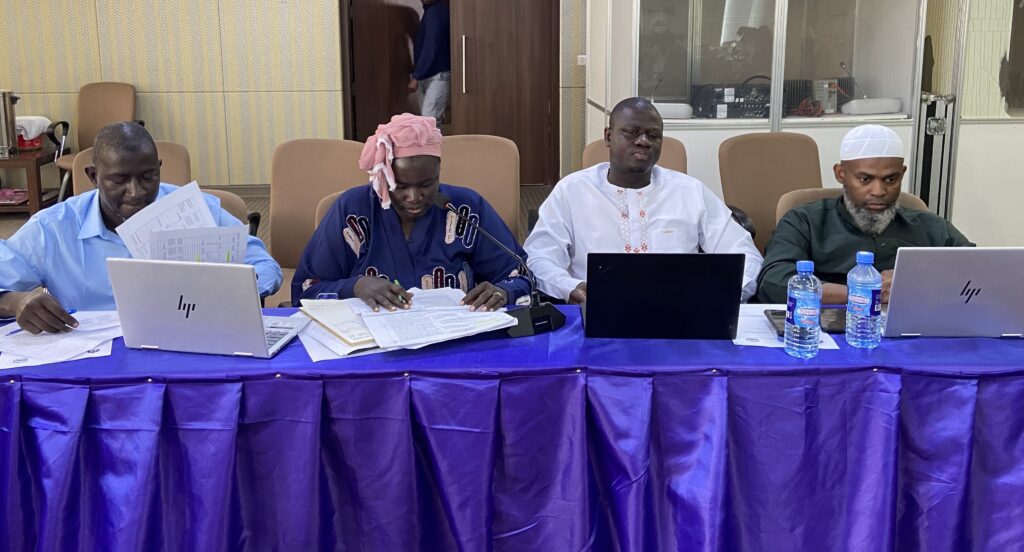AG Office Faces Challenges with Self-Accounting Projects Implementing IFMIS Systems

Officials From The Office Of Accountant General
By Ramatoulie Jawo
The Deputy Accountant General, Ousman Darboe, has informed the National Assembly Standing Committee on Finance and Public Accounts (FPAC) that his office is encountering difficulties getting Self-Accounting Projects to adopt the Integrated Financial Management Information System (IFMIS).
The Accountant General’s Office appeared before the FPAC to provide an update on the implementation of the National Assembly’s resolution. As of September 30, 2023, the Assembly had passed a resolution mandating that all government projects use IFMIS for their accounting processes.
“So far, we have been doing the rollout for all the subvented agencies and the self-accounting projects. Basically, we have so far rolled out to most of the subvented agencies; about 26 of them are already on board. We are also rolling out the self-accounting project due we are facing some kind of resistance in terms of accepting the system, which gives us some challenges in terms of achieving the number that we want to achieve in terms of the rollout,” Darboe said.
Mr. Darboe mentioned that the subvented agencies are progressing smoothly, having already covered more than half of the approximately 50 subvented agencies. Currently, around 26 of these agencies, including all general hospitals, are fully utilizing the IFMIS system.
He further noted that some agencies have even generated their financial statements through the IFMIS system.
“So for the self-accounting projects, we are struggling with them in terms of accepting the IFMIS as their main system, though some have started using the IFMIS as their system, but still that resistance is there,” Mr Darboe told the committee.
Darboe highlighted that, despite the challenges with the self-accounting projects, the embassies have fully adopted IFMIS, and all eight local councils are now using the system. The IFMIS system is capable of producing financial statements, and these institutions have been trained on how to use the system from start to finish.
“The Sub treasuries all of them are using the local councils also all the 8 Local area councils have been roll out, and they are all fully using the IFMIS and the system is capable of producing the financial statements, and they have been taken through everything from start to finish including the production of the financial statements but the main challenges of most of this implementing agencies is the full acceptance because some will accept but is kind of like partial acceptance, and then you come up with some small excuses like this report is not coming which is not a showstopper for you to be unable to produce your financial statements because all of them are having their account’s office,”he said.
Mr. Darboe highlighted that while some individuals claim the system does not meet their needs, they have already provided their information into it. He emphasized that with complete acceptance and commitment, the system can function effectively.
“So basically if there is acceptance and commitment we believe that the software solution is only one solution once another person can utilize it to achieve what he wants you should also use it to achieve what you want If you need some other infrastructures you should put it in your budget and get the right internet and then use the internet fully just like other entities are doing but so far we are moving fine especially for the subvented agencies we are nearly completing the subvented agencies to be fully utilizing the IFMIS system, but for the self accounting projects that is where we are having some kind of resistance in terms of accepting the system as their core financial management system,” he said.
Hon. Touma Njie, a committee member, inquired about the reasons behind the resistance to self-accounting projects, despite significant investments in the system.
In response, Mr. Darboe explained that the resistance might be rooted in a reluctance to change from a system they are accustomed to.
He elaborated, “And now, when the change comes, there is more transparency and there is more access to information because the system you are using, maybe probably you are the only one who has access, but now that it is in the IFMIS system, somebody can be sitting even at the level of the Accountant General. Once you have access to it, you have access to all the information. And they complain that their Internet is not strong, but yet still you will find them in offices using their routers on their own laptops, so you cannot dedicate that resource to the system.”

